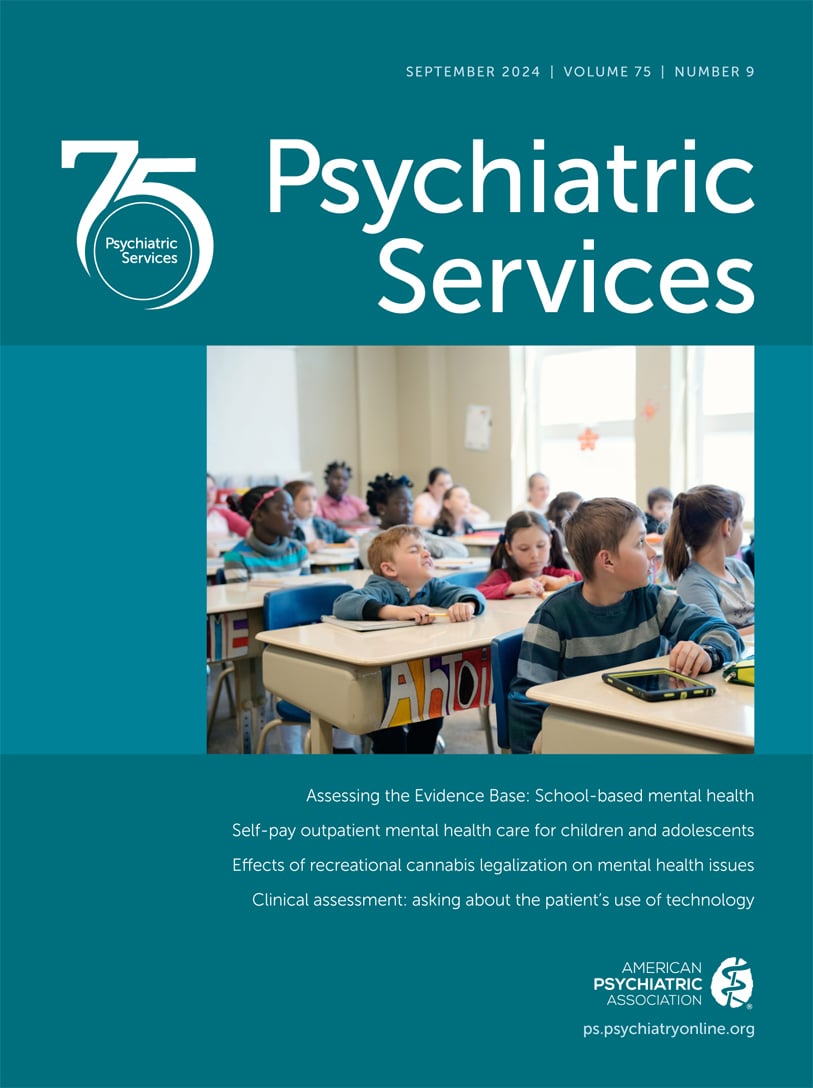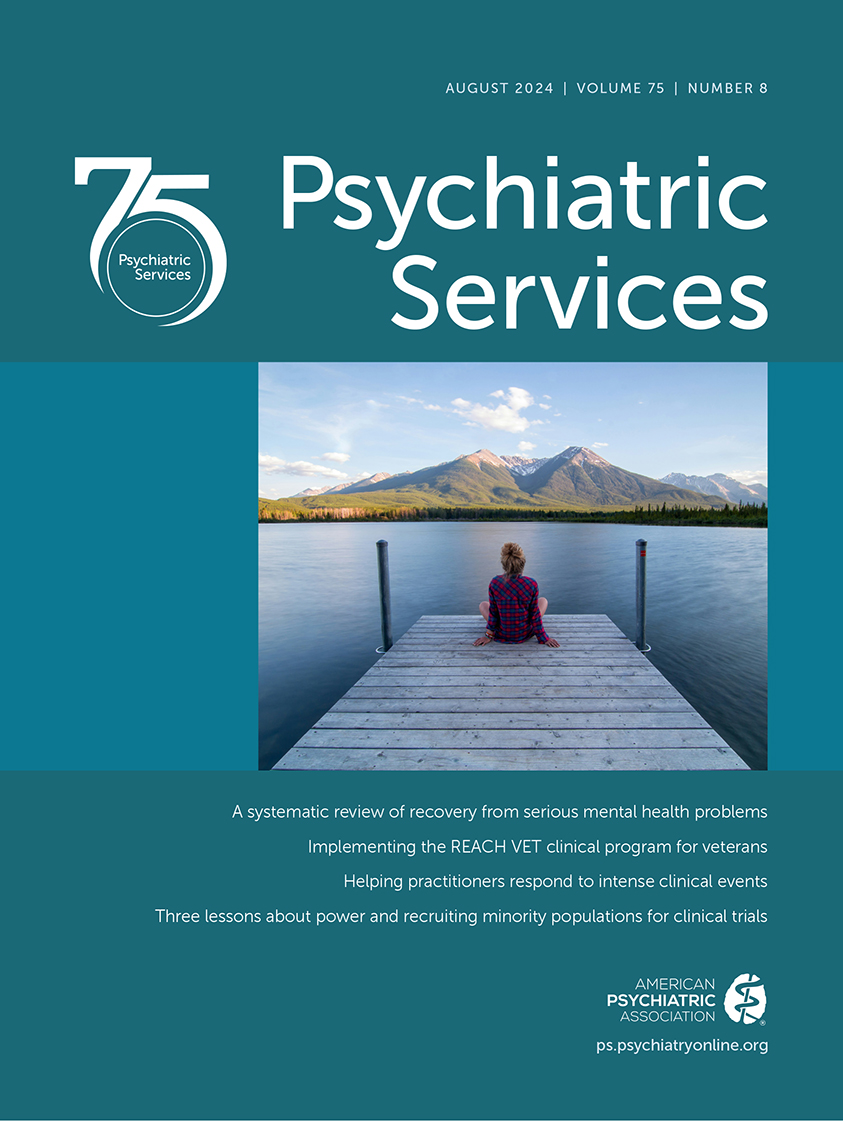Psychiatric Services
- Volume 65
- Number 12
- December 2014
This Month’s Highlights
Our Reviewers
Taking Issue
Articles
Publication date: 01 December 2014
Pages1409–1413Objective: This study evaluated preferences for shared decision making with respect to mental health treatment in a sample of veterans who were diagnosed as having serious mental illness. Methods: Participants were 239 outpatients receiving care from the ...
https://doi.org/10.1176/appi.ps.201400131Publication date: 01 December 2014
Pages1414–1419Objective: This study examined demographic, military, temporal, and logistic variables associated with improvement of posttraumatic stress disorder (PTSD) among Iraq and Afghanistan veterans who received mental health outpatient treatment from the U.S. ...
https://doi.org/10.1176/appi.ps.201300453Publication date: 01 December 2014
Pages1420–1425Objective: The Veterans Health Administration (VHA) has worked to increase availability of mental health treatment for rural veterans. The objective was to understand the impact of rural residence on screening for, diagnosis of, and treatment for ...
https://doi.org/10.1176/appi.ps.201300041Publication date: 01 December 2014
Pages1426–1432Objective: This study’s objective was to determine the efficacy of benefits counseling in a clinical trial. There has been concern that disability payments for psychiatric disorders reduce incentives for employment and rehabilitation. Benefits counseling, ...
https://doi.org/10.1176/appi.ps.201300478Publication date: 01 December 2014
Pages1433–1438Objective: Psychotropic drug development is perceived to be lagging behind other pharmaceutical development, even though there is a need for more effective psychotropic medications. This study examined the state of the current psychotropic drug pipeline ...
https://doi.org/10.1176/appi.ps.201400044Publication date: 01 December 2014
Pages1439–1444Objective: This study prospectively examined the naturalistic adoption of clinical and business evidence-informed training by all 346 outpatient mental health clinics licensed to treat children, adolescents, and their families in New York State. Methods: The ...
https://doi.org/10.1176/appi.ps.201300535Publication date: 01 December 2014
Pages1445–1451Objective: Children with histories of abuse or neglect are the most expensive child population to insure for their mental health needs. This study aimed to quantify the magnitude of Medicaid expenditures incurred in the purchase of psychotropic drugs for ...
https://doi.org/10.1176/appi.ps.201400028Publication date: 01 December 2014
Pages1452–1457Objectives: The specific objectives were to investigate changes in the prevalence of psychotropic medication use for each year increase in age from three to six years old among children in foster care and to examine time-varying odds of longer duration of ...
https://doi.org/10.1176/appi.ps.201300353Publication date: 01 December 2014
Pages1458–1464Objective: Reducing overuse of second-generation antipsychotics among Medicaid-enrolled children is a national priority, yet little is known about how service organization affects use. This study compared differences in second-generation antipsychotic ...
https://doi.org/10.1176/appi.ps.201300574Publication date: 01 December 2014
Pages1465–1473Objectives: For attention-deficit hyperactivity disorder (ADHD), treatment seeking is a critical first step in treatment initiation and remains insufficiently understood. The aims of this study were to estimate ADHD treatment-seeking probabilities over the ...
https://doi.org/10.1176/appi.ps.201300298Publication date: 01 December 2014
Pages1474–1482Objective: This study examined whether racial-ethnic differences in satisfaction with and perceived benefits from mental health services vary by geographic region among U.S. adults. Methods: Drawn from the Collaborative Psychiatric Epidemiology Surveys (CPES)...
https://doi.org/10.1176/appi.ps.201300440Open Forum
Publication date: 01 December 2014
Pages1483–1486Shared decision making has found its way into mental health care to a limited extent only, and especially “challenging” patients do not benefit from this approach. The authors describe barriers to shared decision making among mental health professionals ...
https://doi.org/10.1176/appi.ps.201400307Brief Reports
Publication date: 01 December 2014
Pages1488–1491Objective: This study explored the association between shared decision making and consumers’ illness management skills and consumer-provider relationships. Methods: Medication management appointments for 79 consumers were audio recorded. Independent coders ...
https://doi.org/10.1176/appi.ps.201300563Publication date: 01 December 2014
Pages1492–1495Objective: The objective of this study was to compare outcomes of psychiatrists and nonpsychiatrist physicians enrolled in state physician health programs for substance use disorders. Methods: The study used the data set from a five-year, longitudinal cohort ...
https://doi.org/10.1176/appi.ps.201300472Publication date: 01 December 2014
Pages1496–1498Objective: The relationship of work-related discrimination to the change in self-stigma and stigma stress was assessed among supported employment participants in Switzerland. Methods: Self-stigma and the cognitive appraisal of mental illness stigma as a ...
https://doi.org/10.1176/appi.ps.201400073Publication date: 01 December 2014
Pages1499–1501Objective: Understanding the experience of individuals across stages of schizophrenia is important for development of services to promote recovery. As yet, little is known about the experience of individuals who exhibit prodromal symptoms of schizophrenia. ...
https://doi.org/10.1176/appi.ps.201300527Publication date: 01 December 2014
Pages1502–1505Objective: This study examined the extent to which patients found to have clinically significant hyperglycemia after beginning a new antipsychotic receive guideline concordant management. Methods: This retrospective cohort analysis (N=403) used U.S. ...
https://doi.org/10.1176/appi.ps.201300514Columns
Publication date: 01 December 2014
Pages1406–1408Tobacco use results in numerous consequences for individuals with mental illnesses and other substance use disorders, yet it is not adequately addressed by behavioral health professionals, including psychiatrists. This column describes current inaction ...
https://doi.org/10.1176/appi.ps.201400235Letters
Book Reviews
News & Notes
Past Issues
View Issues Archive
Vol. 75 | No. 11

Vol. 75 | No. 10

Vol. 75 | No. 9
